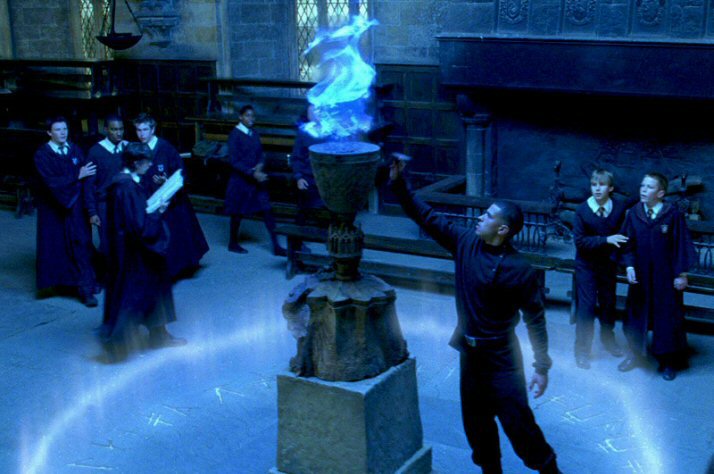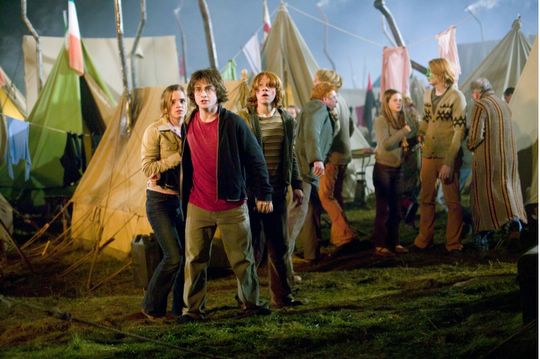
is on the climb…which means trouble ahead for Harry and Hogwarts in the surprisingly satisfying Harry Potter and the Goblet of Fire. I said of Alfonse Cuaron’s Azkaban that it was probably the ablest representation of the Rowling books we were going to get on film, but you know what? I was dead wrong. Mike Newell’s dark and delectable Goblet is brimming over with energy and suspense, and, to my surprise, it’s probably the best Potter film so far. (And this is coming from someone who actually preferred Book III to Book IV on paper.)
I assume most of y’all out there already know the story, but in a nutshell, Harry’s fourth year at England’s premiere Magickal Boarding School is one marked by three novel, terrifying, and wholly inscrutable challenges: (1) The Tri-Wizard Tournament (held every few years against rival academies Beauxbatons and Durmstrang); (2) the possible return of You-Know-Who (as announced by the sight of His Mark at the Quidditch World Cup); and (3) girls. Yes, on top of their usual troubles with magical enchantments and strange goings-on, Harry, Ron, and Hermione have hit those awkward middle school years, when a brief conversation with Cho Chang (Katie Leung), a waltz with Parvati Patel (Shefali Chowdhury), a bath with Moaning Myrtle (Shirley Henderson), or a date with Victor Krum (Stanislav Ianevski) becomes as nerve-rattling as facing down a wayward basilisk. Nevertheless, the Yule Ball is only the least of Harry’s worries, as — for some reason and in defiance of all the usual protocols — he’s been picked as a fourth entrant in the highly dangerous TriWizard Tournament…and, even with the aid of new Dark Arts teacher Mad-Eye Moody (a superb Brendan Gleeson), it’ll take all the wits and combined resources of our teenage trio (well, and Neville) for Harry to make it through intact.
To their credit, Newell and screenwriter Steve Kloves have done an excellent job scaling down the dense 700-page novel into a sleek two-and-a-half-hour film. Goblet moves at such a brisk clip that rarely did I find myself (as I did in Azkaban) enumerating the remaining plot points to be explained. [For what it’s worth, the House Elf subplot is gone, Rita Skeeter (Miranda Richardson, note-perfect) has basically one-and-a-half scenes, and the other TriWizard contestants — particularly poor Fleur Delacour (Clemence Poesy) — get somewhat short shrift.] In fact, even Harry’s usual nemeses — Severus Snape (Alan Rickman) and the scions of Slytherin — are for the most part pushed to the background here (although fans of those Schoolboys in Disgrace, the Weasley twins, will be happy to know that they get considerable screen time, and Ginny’s always lurking around too.)
Whatsmore, we’re definitely in PG-13 land this time. [Warning: Here there be spoilers, particularly for non-book-readers] Goblet is a film filled with unsettling images from its opening moments, from the floating Death Head above the World Cup to the highly creepy Pensieve flashback of Karkaroff’s plea hearing (Given recent events involving torture and secret prisons, I found this scene — and the contraption they were keeping Karkaroff in — particularly perturbing.) So it’s a testament to Newell’s vision that the scene everyone’s waiting for in Goblet of Fire, the big climax, is the creepiest one of all. The wretched, fetal You-Know-Who was disturbing enough, but once Voldemort emerges in all his twisted glory (looking a bit like the head vampire in Blade 2), Ralph Fiennes ratchets up the freak to eleven and almost runs away with the film. As I went to sleep last night after the midnight show, it was Fiennes’ crisp, lithe, and serpentine Voldemort (and his band of Klannish Death Eaters) that stuck in my head, exactly as it should be.
[As a tangent, and I’m probably thinking about this too much, but now I really like the shaggy haired dos of all our protagonists in context of the film — I don’t think it’s just a nod to Kinks/Pink Floyd-ish boarding house visions or a post-Anakin fad. There’s method to Newell’s madness…As Stephanie Zacharek also points out, he’s deliberately invoking the 70’s as the uncertain, transitional adolescence after the heyday of the Sixties, as well as the cultural moment just before Thatcherism and the Tory revival. Everything’s going to change, indeed.]

